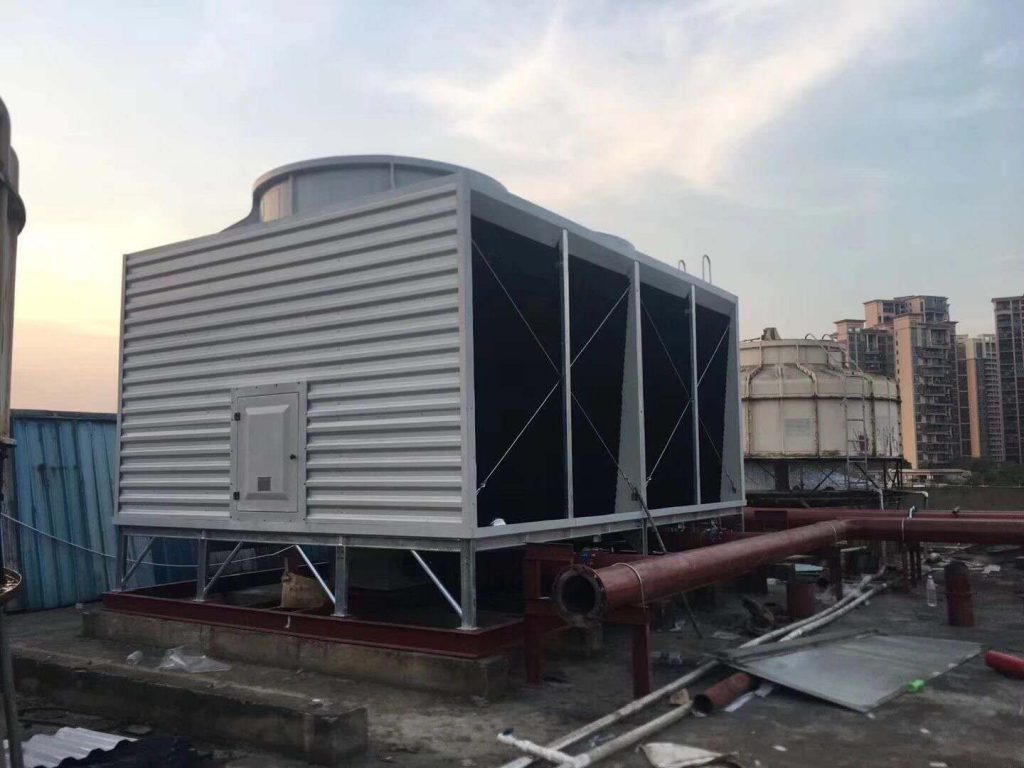Role of Cooling Tower in Food & Beverage industry
The role of the cooling tower in the Food & Beverage (F&B) industry is absolutely critical, as it directly supports both production efficiency and product safety.
It is not an exaggeration to say that without a reliable cooling tower, most large-scale F&B plants would grind to a halt.
Here’s a detailed breakdown of its role, categorized by key functions.
1. Process Cooling: The Core of Production
This is the most direct role. Many food and beverage manufacturing processes generate significant heat that must be removed to proceed.
- Examples:
- Pasteurization: Milk, juices, beers, and other liquids are heated to a specific temperature to kill pathogens and then must be rapidly cooled to preserve flavor and shelf life. The cooling tower provides the chilled water for the heat exchangers that perform this rapid cooling.
- Fermentation (Beer, Yogurt, etc.): Fermentation is an exothermic (heat-producing) process. Precise temperature control is vital for controlling the rate of fermentation, yeast health, and final product flavor profile. Cooling towers remove this excess heat from fermentation tanks.
- Baking & Confectionery: Cooling tunnels for baked goods, chocolate tempering, and candy hardening all require precisely controlled cooling water.
Compressed Air Cooling: Large air compressors used for packaging and pneumatic equipment generate heat and require cooling to operate efficiently
- Condensation in Evaporation: In operations like sugar refining or concentrate production, evaporators boil off water, and the vapors must be condensed. Cooling towers supply water to these condensers.
2. Refrigeration Support: The Cold Chain Backbone
This is often the largest cooling load in a F&B plant.
- How it Works: The cooling tower is an integral part of the chilled water system. It cools the water that is used to absorb heat from the plant’s refrigeration system’s condenser.
- Simple Analogy: Your refrigerator has a condenser on the back that gets hot. A F&B plant’s refrigeration system is the same, but on a massive scale. The cooling tower’s job is to cool that condenser, making the entire refrigeration cycle much more efficient.
- Importance: This refrigeration is essential for:
- Blast Chilling/Freezing: Rapidly cooling cooked products to safe temperatures.
- Cold Storage: Keeping warehouses and storage areas at safe temperatures for raw materials (meat, dairy) and finished products.
- Process Areas: Maintaining low temperatures in production areas for items like ice cream or ready-to-eat meals.
3. Water and Energy Conservation
Cooling towers are a cornerstone of sustainable and cost-effective operations.
- Water Recycling: Instead of using a continuous flow of fresh, potable “city water” for cooling and then dumping it down the drain (a “once-through” system), a cooling tower recycles the same water repeatedly. It only requires a small amount of make-up water to replace what is lost through evaporation and drift. This leads to massive water savings.
- Energy Efficiency: By rejecting heat to the atmosphere through evaporation, cooling towers are a highly efficient method of cooling compared to air-cooled systems, especially for large industrial loads. This significantly reduces electricity consumption, which is a major operational cost.
Special Considerations in the Food & Beverage Industry
The role of the cooling tower extends beyond just cooling; it involves critical responsibilities for safety and compliance.
1. Microbiological Control (A Major Food Safety Risk)
The warm, wet, and oxygen-rich environment inside a cooling tower is an ideal breeding ground for bacteria, most notably Legionella pneumophila, which causes Legionnaires’ disease.
- Role of the Plant: To implement a rigorous Water Treatment Management Program. This includes:
- Biocides: To control bacterial growth.
- Scale and Corrosion Inhibitors: To maintain system efficiency and integrity.
- Regular Testing: Frequent monitoring of microbiological activity and water chemistry.
- This is not just an equipment maintenance issue; it is a critical public health responsibility to prevent aerosolized water droplets from the tower from becoming a health hazard.
. Preventing Product Contamination
The cooling tower circuit is a closed loop with respect to the process. The water circulating through the tower is completely separate from the product (e.g., milk, juice). They only exchange heat through a barrier, typically a plate heat exchanger. This physical separation is vital to ensure that any chemicals or microbes in the cooling water can never come into contact with the food product.
3. Hygienic Design and Materials
In food plants, cooling towers are often specified with materials that resist corrosion and are easy to clean, such as stainless steel or FRP (Fiber Reinforced Plastic), to support overall plant hygiene standards.
